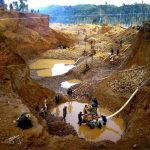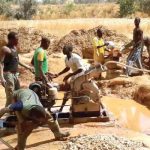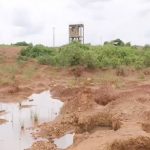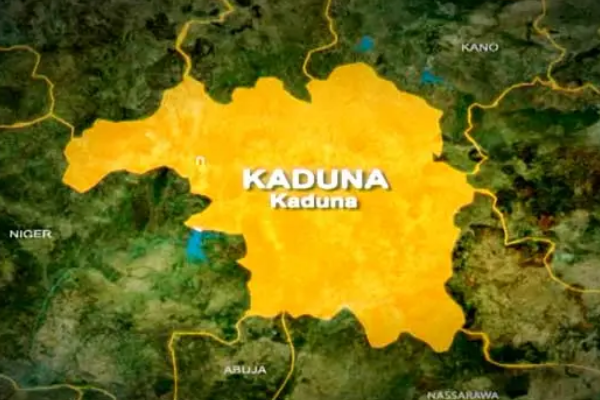The Federal Government has directed all illegal artisanal miners working in Gombe State to register and legitimise their businesses.
This comes as the Ministry of Mines and Steel increases its surveillance and regulation of mining operations in the state.
Quarry operators are also dissatisfied with the high cost of diesel and the many taxes.
From sapphire to limestone, granite, fluoride, and coal, Gombe State has it all.
Except for a few companies, the majority of mining is done by hand.

Many are unable to register their mining businesses, hence they work under licensed operators.
There are thousands of artisanal and frequently illegal miners working throughout Nigeria.
Mine and steel industry officials are looking for ways to legitimise the activities of these unregistered miners.
With crude oil revenue diminishing, efficient commercialisation and exploitation of solid minerals could fill the void.
As investors groan under the weight of high operating expenses, insecurity, and a plethora of taxes, it is evident that Nigeria’s massive mineral deposits and value chain are vastly underutilised.
The Federal Government has directed all illegal artisanal miners working in Gombe State to register and legitimise their businesses.
This comes as the Ministry of Mines and Steel increases its surveillance and regulation of mining operations in the state.
Quarry operators are also dissatisfied with the high cost of diesel and the many taxes.
From sapphire to limestone, granite, fluoride, and coal, Gombe State has it all.
Except for a few companies, the majority of mining is done by hand.

Many are unable to register their mining businesses, hence they work under licensed operators.
There are thousands of artisanal and frequently illegal miners working throughout Nigeria.
Mine and steel industry officials are looking for ways to legitimise the activities of these unregistered miners.
With crude oil revenue diminishing, efficient commercialisation and exploitation of solid minerals could fill the void.
As investors groan under the weight of high operating expenses, insecurity, and a plethora of taxes, it is evident that Nigeria’s massive mineral deposits and value chain are vastly underutilised.
The Federal Government has directed all illegal artisanal miners working in Gombe State to register and legitimise their businesses.
This comes as the Ministry of Mines and Steel increases its surveillance and regulation of mining operations in the state.
Quarry operators are also dissatisfied with the high cost of diesel and the many taxes.
From sapphire to limestone, granite, fluoride, and coal, Gombe State has it all.
Except for a few companies, the majority of mining is done by hand.

Many are unable to register their mining businesses, hence they work under licensed operators.
There are thousands of artisanal and frequently illegal miners working throughout Nigeria.
Mine and steel industry officials are looking for ways to legitimise the activities of these unregistered miners.
With crude oil revenue diminishing, efficient commercialisation and exploitation of solid minerals could fill the void.
As investors groan under the weight of high operating expenses, insecurity, and a plethora of taxes, it is evident that Nigeria’s massive mineral deposits and value chain are vastly underutilised.
The Federal Government has directed all illegal artisanal miners working in Gombe State to register and legitimise their businesses.
This comes as the Ministry of Mines and Steel increases its surveillance and regulation of mining operations in the state.
Quarry operators are also dissatisfied with the high cost of diesel and the many taxes.
From sapphire to limestone, granite, fluoride, and coal, Gombe State has it all.
Except for a few companies, the majority of mining is done by hand.

Many are unable to register their mining businesses, hence they work under licensed operators.
There are thousands of artisanal and frequently illegal miners working throughout Nigeria.
Mine and steel industry officials are looking for ways to legitimise the activities of these unregistered miners.
With crude oil revenue diminishing, efficient commercialisation and exploitation of solid minerals could fill the void.
As investors groan under the weight of high operating expenses, insecurity, and a plethora of taxes, it is evident that Nigeria’s massive mineral deposits and value chain are vastly underutilised.
The Federal Government has directed all illegal artisanal miners working in Gombe State to register and legitimise their businesses.
This comes as the Ministry of Mines and Steel increases its surveillance and regulation of mining operations in the state.
Quarry operators are also dissatisfied with the high cost of diesel and the many taxes.
From sapphire to limestone, granite, fluoride, and coal, Gombe State has it all.
Except for a few companies, the majority of mining is done by hand.

Many are unable to register their mining businesses, hence they work under licensed operators.
There are thousands of artisanal and frequently illegal miners working throughout Nigeria.
Mine and steel industry officials are looking for ways to legitimise the activities of these unregistered miners.
With crude oil revenue diminishing, efficient commercialisation and exploitation of solid minerals could fill the void.
As investors groan under the weight of high operating expenses, insecurity, and a plethora of taxes, it is evident that Nigeria’s massive mineral deposits and value chain are vastly underutilised.
The Federal Government has directed all illegal artisanal miners working in Gombe State to register and legitimise their businesses.
This comes as the Ministry of Mines and Steel increases its surveillance and regulation of mining operations in the state.
Quarry operators are also dissatisfied with the high cost of diesel and the many taxes.
From sapphire to limestone, granite, fluoride, and coal, Gombe State has it all.
Except for a few companies, the majority of mining is done by hand.

Many are unable to register their mining businesses, hence they work under licensed operators.
There are thousands of artisanal and frequently illegal miners working throughout Nigeria.
Mine and steel industry officials are looking for ways to legitimise the activities of these unregistered miners.
With crude oil revenue diminishing, efficient commercialisation and exploitation of solid minerals could fill the void.
As investors groan under the weight of high operating expenses, insecurity, and a plethora of taxes, it is evident that Nigeria’s massive mineral deposits and value chain are vastly underutilised.
The Federal Government has directed all illegal artisanal miners working in Gombe State to register and legitimise their businesses.
This comes as the Ministry of Mines and Steel increases its surveillance and regulation of mining operations in the state.
Quarry operators are also dissatisfied with the high cost of diesel and the many taxes.
From sapphire to limestone, granite, fluoride, and coal, Gombe State has it all.
Except for a few companies, the majority of mining is done by hand.

Many are unable to register their mining businesses, hence they work under licensed operators.
There are thousands of artisanal and frequently illegal miners working throughout Nigeria.
Mine and steel industry officials are looking for ways to legitimise the activities of these unregistered miners.
With crude oil revenue diminishing, efficient commercialisation and exploitation of solid minerals could fill the void.
As investors groan under the weight of high operating expenses, insecurity, and a plethora of taxes, it is evident that Nigeria’s massive mineral deposits and value chain are vastly underutilised.
The Federal Government has directed all illegal artisanal miners working in Gombe State to register and legitimise their businesses.
This comes as the Ministry of Mines and Steel increases its surveillance and regulation of mining operations in the state.
Quarry operators are also dissatisfied with the high cost of diesel and the many taxes.
From sapphire to limestone, granite, fluoride, and coal, Gombe State has it all.
Except for a few companies, the majority of mining is done by hand.

Many are unable to register their mining businesses, hence they work under licensed operators.
There are thousands of artisanal and frequently illegal miners working throughout Nigeria.
Mine and steel industry officials are looking for ways to legitimise the activities of these unregistered miners.
With crude oil revenue diminishing, efficient commercialisation and exploitation of solid minerals could fill the void.
As investors groan under the weight of high operating expenses, insecurity, and a plethora of taxes, it is evident that Nigeria’s massive mineral deposits and value chain are vastly underutilised.














